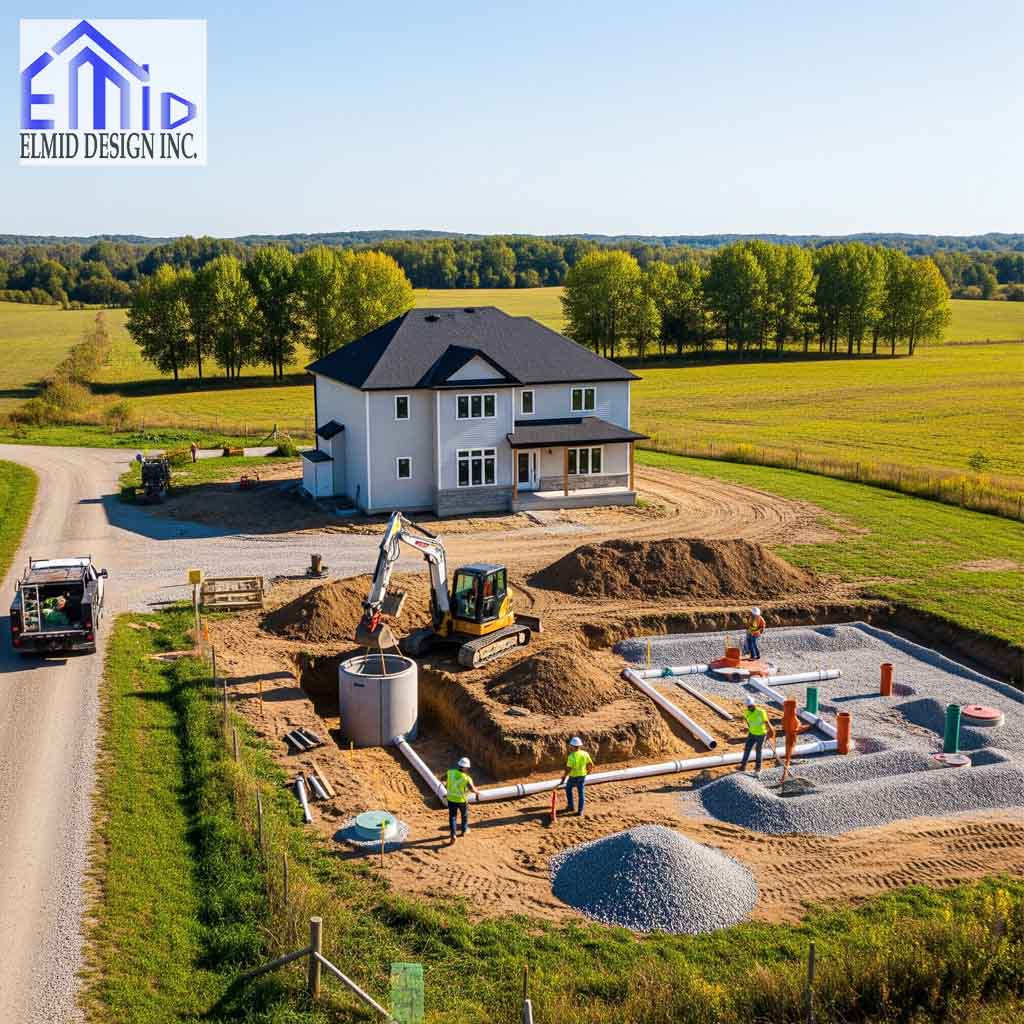If you’re planning to build or upgrade a home in Orangeville, septic design is one of the most important things you need to understand. Septic systems aren’t just about digging a hole and placing a tank—they’re highly regulated, engineered systems that must follow the Ontario Building Code. Whether you’re building a new home or replacing an old system, the success of your project starts with expert septic design. In Orangeville, soil type, groundwater, and slope all play huge roles in what’s allowed and what isn’t. This is where certified professionals like Elmid Design Inc.—a firm holding a Certificate of Authorization from Professional Engineers Ontario (PEO)—come into play.
Key Takeaways
Every property in Orangeville must meet strict septic regulations based on the Ontario Building Code.
Hiring a licensed septic designer ensures legal compliance and environmental protection.
Site conditions in Orangeville, including soil and slope, determine the type of system you can install.
PEO-certified engineering firms like Elmid Design Inc. offer the trust and expertise required by municipalities.
Costs vary but always include site assessments, drawings, and permit coordination.
What Is Septic Design Orangeville?
Septic design in Orangeville refers to the planning and engineering of a private sewage system tailored to a specific residential or rural property. These systems treat and dispose of wastewater from buildings that aren’t connected to municipal sewer services. The design process includes soil evaluations, load calculations, tank sizing, and layout planning. What makes Orangeville unique is its mixed geology, requiring septic engineers to consider seasonal water levels and soil permeability before submitting plans to the municipality. A poorly designed system risks failure, pollution, and legal consequences, making it essential to hire professionals. Every septic plan must be approved by the local municipality and comply with provincial guidelines, especially Ontario Building Code Part 8. Choosing a design firm familiar with Orangeville’s permitting landscape—like Elmid Design Inc.—ensures your project stays compliant, timely, and safe.
Local Regulations and Permits in Orangeville
Before installing a septic system in Orangeville, you must submit detailed design drawings and obtain a permit from the municipal building department. This process follows the standards outlined in Part 8 of the Ontario Building Code. The municipality requires a licensed professional to prepare the septic design, and the application typically includes a site plan, test hole logs, and a design summary report. Properties within environmentally sensitive areas face even stricter rules, often needing clearance from conservation authorities. Submitting incomplete or inaccurate information will result in delays or rejections. That’s why working with an engineering firm like Elmid Design Inc.—which understands Dufferin County’s permit processes and has PEO certification—adds reliability to your application. These professionals prepare everything correctly the first time, reducing your wait time and increasing your project’s success. Their familiarity with Orangeville’s terrain and municipal requirements offers peace of mind and prevents costly redesigns or rejections.
Ontario Septic Design Standards
All septic systems in Orangeville must meet the standards outlined in Ontario Building Code Part 8. This code governs everything from tank sizing and setback distances to soil loading rates and system types. Depending on the site, allowable systems include conventional, raised bed, and tertiary treatment units. System selection is based on household size, soil absorption rates, and proximity to wells or water bodies. These technical requirements ensure that systems function safely and sustainably on residential lots.
In Orangeville, challenging conditions like clay soil or high groundwater often require engineered solutions such as raised beds or advanced filters. These alternatives meet environmental requirements while still supporting efficient wastewater treatment. Hiring a qualified engineering firm, like Elmid Design Inc., ensures your design meets both local and provincial codes. Their team customizes every system to the site’s conditions, ensuring long-term performance. Septic design isn’t just about permits—it’s about building a reliable system that protects your property.
Site Assessment for Orangeville Properties
A septic system’s design depends entirely on a site-specific assessment, which evaluates the soil’s ability to absorb wastewater. In Orangeville, this begins with test holes dug to a depth of about five feet, where engineers assess soil texture, moisture levels, and the depth to groundwater. They also check for clay layers, bedrock, or sand—all of which affect drainage and system type. Properties with steep slopes or near wetlands often need specialized designs. When typical systems aren’t feasible, mound systems or tertiary treatment units may be recommended. Without a professional assessment, you’re risking system failure or denial of your permit. Firms like Elmid Design Inc. conduct these evaluations using precise methods and prepare detailed reports required by the municipality. Their engineers ensure your site meets all technical and regulatory requirements. That level of detail protects your investment and the environment while speeding up the approval process.
Choosing a Professional in Orangeville
Your septic system’s quality depends entirely on who designs it. In Orangeville, only licensed professionals can submit septic designs for permit approval. While companies like Allto Construction, Yetti Construction, and Headwaters Construction offer installation services, not all of them meet the engineering certification standards set by PEO. This gap in credentials often affects compliance and approval timelines.
Elmid Design Inc. stands out as a fully certified engineering firm authorized by Professional Engineers Ontario. Their septic designs meet Ontario Building Code requirements and are backed by legal accountability and technical expertise. Choosing a PEO-certified firm ensures your design includes engineer-stamped drawings, which helps satisfy local building officials and speeds up your permit. These professionals also support you during municipal reviews or disputes. In the long run, working with a certified firm like Elmid Design Inc. protects your investment, avoids delays, and ensures your septic system performs reliably for years to come.
Design Considerations and Best Practices
A strong septic design doesn’t just meet today’s needs—it plans for the future. In Orangeville, that means considering possible home expansions, secondary units, or landscaping changes. It also involves selecting materials that withstand harsh winters, heavy rain, and root intrusion. For example, using tanks and components from Orangeville Pre-cast ensures durability and local availability. Another best practice is minimizing environmental impact. This includes proper tank placement, drainage control, and soil conservation techniques. Systems should be designed to minimize effluent runoff and maintain water quality. Firms like Elmid Design Inc. incorporate these considerations into every project. They use design tools and calculations based on years of local experience, ensuring your system functions properly for decades. When systems are designed with sustainability and scalability in mind, they deliver better long-term performance and reduce the risk of future problems or fines.

Cost and Timeline Expectations
Understanding the cost and timeline for septic design in Orangeville helps you plan your project effectively. Typically, the design phase starts with a site visit and soil test, followed by drafting the design and submitting it for approval. This process can take between two to four weeks depending on municipal review times. In terms of cost, homeowners should expect to pay anywhere from $2,000 to $5,000 for a complete design package including soil testing, engineer-stamped drawings, and permit coordination. These prices can vary based on property complexity, system type, and consultant experience. Design firms like Elmid Design Inc. offer value by streamlining the process and avoiding costly rework. Their knowledge of Orangeville regulations ensures faster approvals and fewer complications. Investing in proper design upfront reduces the risk of delays or permit denials, helping you move from planning to installation with confidence and clarity.
Maintenance and Longevity of Septic Systems
A properly designed and installed septic system in Orangeville can last over 20 years, but only if maintained correctly. Routine care is essential to avoid failures that may lead to expensive repairs or environmental damage. Maintenance includes inspecting the tank every two to three years and pumping it when solids reach the recommended limit. Avoiding excess water usage, chemical cleaners, and heavy machinery over the field area also protects your system. Seasonal maintenance is crucial in Orangeville’s climate, where freezing temperatures and spring thaws can stress underground components. Systems designed by experienced professionals like Elmid Design Inc. often include features that make maintenance easier and more reliable. They may recommend effluent filters, risers for easy access, and alarms for overflow prevention. Incorporating these features during the design phase improves performance over time and safeguards your investment against unexpected failures or health risks associated with septic backups.
Real-World Case Study: A Custom Septic System in Orangeville
A local property owner in Orangeville recently purchased land near a protected wetland. The shallow bedrock and clay soil presented serious design challenges, including limited absorption and runoff risks. Instead of a conventional system, a raised bed system with tertiary treatment was recommended to meet environmental constraints. The homeowner contacted Elmid Design Inc. to handle the engineering and permit process. After conducting detailed soil and slope assessments, the team created a design that satisfied both municipal code and conservation authority requirements. Approval was granted in under three weeks due to the completeness of the submission. The system has now been operational for over a year without any performance issues. The owner reported that the process went smoothly and praised the firm’s communication and technical knowledge. This case demonstrates how local expertise and professional engineering can overcome difficult site conditions while ensuring environmental compliance and long-term system functionality.
Comparing Septic System Types in Orangeville
In Orangeville, several types of septic systems are commonly used depending on the property’s specific characteristics. Conventional gravity-fed systems work well in areas with deep, well-draining soil. However, raised bed systems or mound systems are often used in properties with high water tables or shallow bedrock, both of which are common in parts of Dufferin County. Tertiary treatment systems offer an advanced option for environmentally sensitive areas by producing cleaner effluent that meets strict discharge standards. Choosing the right system is not just about location—it also depends on usage levels and local regulations. Working with engineers who understand these variables is critical. For this reason, firms like Elmid Design Inc. tailor each system to match both the client’s goals and the site’s limitations. Their designs not only meet Ontario Building Code standards but also exceed performance expectations, giving homeowners in Orangeville long-term peace of mind and regulatory compliance.
The Role of Engineering in Septic Design
Engineering plays a vital role in the success of any septic system project in Orangeville. It begins with understanding the interaction between soil, water, and wastewater flow. A licensed engineer calculates the daily flow rates, selects the right system type, and ensures all setbacks and loading rates meet Ontario Building Code standards. Site-specific data like elevation changes and drainage patterns are considered before creating final design drawings. These detailed plans form the basis of your municipal permit application. Elmid Design Inc., which holds a Certificate of Authorization from Professional Engineers Ontario, brings a level of precision and legal accountability that is necessary in regulated environments. Municipal reviewers prioritize stamped submissions from certified professionals because they trust the underlying calculations. Homeowners also benefit from smoother approvals and more accurate construction. Without proper engineering, even a well-installed system can fail due to poor planning. This is why professional oversight is essential.
Common Septic Design Mistakes to Avoid
Septic system problems in Orangeville often start long before installation. A major mistake is skipping proper site assessment. Without soil testing, it’s impossible to select the right system, leading to early failure or permit rejection. Soil conditions in the region vary, and guessing never works.
Another common issue is underestimating wastewater flow. If the system is too small for the home, backups and early wear become likely. Placing septic components too close to property lines or wells also creates legal risks and serious safety concerns.
Many of these mistakes happen when homeowners rely on generic designs or unlicensed contractors unfamiliar with Orangeville’s codes. Elmid Design Inc. prevents these issues through site-specific evaluations and engineering expertise. Their team follows Ontario Building Code standards and works closely with local inspectors. That process eliminates delays and avoids expensive redesigns. Poor design might seem like a shortcut, but it often leads to costly, long-term consequences.
Septic System Innovations for Rural Homes
Septic design in Orangeville is evolving as environmental standards become more rigorous and technologies improve. One emerging trend is the use of advanced treatment units that can reduce nitrogen levels, making them ideal for sensitive areas near wetlands or water bodies. Another innovation includes smart monitoring systems that alert homeowners to problems before they become emergencies. These systems are particularly helpful in vacation homes or cottages where the septic system might be left unattended for long periods. Designers now also use 3D modeling software to plan field layouts that maximize space efficiency. Firms like Elmid Design Inc. are incorporating these tools into their design process to create more precise, sustainable, and efficient systems. These innovations not only improve the performance and longevity of septic systems but also help homeowners meet stricter regulatory requirements. Staying informed about these trends can guide better design choices and future-proof your investment.
Environmental Impact of Poor Septic Design
Improper septic system design can significantly harm Orangeville’s local environment. Leaking systems may contaminate groundwater, streams, and nearby wells with bacteria, nitrogen, and other harmful pollutants. These impacts are particularly severe in areas with clay soils or high water tables, which limit natural filtration. A poorly planned system may also create surface pooling, causing unpleasant odors and health risks for surrounding properties. These environmental consequences often result in legal actions, property devaluation, and mandatory system replacement. Responsible design begins with professional evaluation and code-compliant planning. Elmid Design Inc. emphasizes environmental stewardship by ensuring their systems exceed basic compliance standards. Their design strategies focus on minimizing land disturbance and enhancing long-term filtration. By prioritizing both performance and ecology, homeowners protect not just their own land but the broader community. Avoiding environmental damage isn’t just ethical—it’s also essential for maintaining long-term property value and public health in Orangeville.
Long-Term Value of Professional Septic Design
Investing in professional septic design offers long-term benefits that extend beyond simple code compliance. A well-designed system performs efficiently, requires less maintenance, and reduces the likelihood of costly failures. For homeowners in Orangeville, this translates into fewer emergencies, smoother property sales, and better environmental protection. In competitive real estate markets, properties with documented septic designs by licensed engineers like Elmid Design Inc. tend to attract higher offers. These documents demonstrate reliability and compliance, which matters to lenders, insurers, and buyers. Over time, the value of professional design becomes clear. Systems continue to function as intended, even under increased usage or weather stress. Design firms also maintain records and provide follow-up services that DIY or generic plans simply cannot match. For anyone planning long-term residence or future expansion, hiring a qualified septic designer is not just a regulatory requirement—it is a strategic investment in the property’s stability and growth.
Additional FAQs
What is the best septic system for a clay-rich property in Orangeville?
Raised bed or tertiary systems are usually best for clay-rich soils because they allow treated wastewater to filter through engineered layers above the natural ground, ensuring proper drainage and minimizing pooling.
Can I use greywater recycling with my septic system in Orangeville?
Greywater recycling can be used in Orangeville but must be approved by the municipality. The system needs a separate design plan that complies with health and safety standards to prevent contamination.
Do all septic systems need alarms or monitoring?
While not mandatory, alarms and monitoring systems are strongly recommended, especially for advanced or tertiary systems. They provide early warnings for backups or system malfunctions, reducing emergency repair costs.
Are permits from conservation authorities also required?
Yes, if your property is near a regulated wetland, river, or forest, you may need permits from agencies like the Credit Valley Conservation in addition to the municipal building permit.
Does Elmid Design Inc. only work in Orangeville?
No, Elmid Design Inc. serves many parts of Ontario, though they specialize in septic designs tailored to Orangeville and Dufferin County. Their regional experience helps streamline approvals and enhance local system performance.

Why Elmid Design Inc. Leads Septic Design in Orangeville
Elmid Design Inc. is a trusted engineering firm specializing in septic system design across Orangeville and surrounding areas. With a Certificate of Authorization from Professional Engineers Ontario (PEO), they provide code-compliant, site-specific solutions backed by expert knowledge. Their designs meet Ontario Building Code Part 8 requirements and are tailored to local soil, slope, and usage conditions. Homeowners, builders, and municipalities rely on Elmid Design Inc. for fast approvals, detailed documentation, and long-term performance. Their professional approach ensures every septic project is efficient, environmentally sound, and built to last.
Geographic Locations That We Service:
Our Licensed Professional Engineers specializing in Engineered Site Grading Plans offer the best-engineered site grading plan, lot grading and erosion plan, and drainage plan to obtain site plan approval and building permits in Ontario, including a wide range of municipalities. Each area boasts unique features and requirements, making our tailored approach essential for success.
Toronto and Surrounding Areas
In the vibrant heart of Ontario, we service Toronto (City of Toronto) and surrounding areas. Additionally, we cover Oshawa (City of Oshawa), Pickering (City of Pickering), and Clarington (Municipality of Clarington). Furthermore, our expertise extends to Ajax (Town of Ajax), Whitby (Town of Whitby), Brock (Township of Brock), Scugog (Township of Scugog), and Uxbridge (Township of Uxbridge).
Halton Region
Moving to the Halton Region, our services encompass Burlington (City of Burlington) and Halton Hills (Town of Halton Hills). Also included are Milton (Town of Milton) and Oakville (Town of Oakville).
Peel Region
In the Peel Region, we provide services in Brampton (City of Brampton), Mississauga (City of Mississauga), and Caledon (Town of Caledon).
York Region
Our services in the York Region cover Vaughan (City of Vaughan), Aurora (Town of Aurora), and East Gwillimbury (Town of East Gwillimbury). We also cater to Georgina (Town of Georgina), Markham (City of Markham), Newmarket (Town of Newmarket), Richmond Hill (City of Richmond Hill), Whitchurch-Stouffville (Town of Whitchurch-Stouffville), King (Township of King), and Bradford-West Gwillimbury (Town of Bradford-West Gwillimbury). Each municipality here offers a distinct setting, requiring our specialized approach.
Other Southern Ontario Cities and Towns
We also serve many other cities and towns in Southern Ontario. These include Hamilton (City of Hamilton), St. Catharines (City of St. Catharines), Niagara on the Lake (Town of Niagara on the Lake), Brant (County of Brant), Cambridge (City of Cambridge), Kitchener (City of Kitchener), Waterloo (City of Waterloo), and Woodstock (City of Woodstock). Furthermore, we operate in Guelph (City of Guelph), Centre Wellington (Township of Centre Wellington), Shelburne (Town of Shelburne), Orangeville (Town of Orangeville), New Tecumseth (Town of New Tecumseth), Essa (Town of Essa), Collingwood (Town of Collingwood), Wasaga Beach (Town of Wasaga Beach), Barrie (City of Barrie), Midland (Town of Midland), Orillia (City of Orillia), Ramara (Town of Ramara), Minden Hills (Town of Minden Hills), North Kawartha (Town of North Kawartha), Kawartha Lakes (City of Kawartha Lakes), Peterborough (City of Peterborough), Selwyn (Town of Selwyn), and Brighton (Municipality of Brighton).




